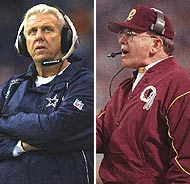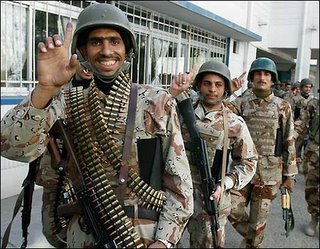"
I knew (President Bush)
was lying, a criminal act against our nation to start a false illegal war. I am against pre emptive illegal wars based on complete lies and forging and twisting of intelligence to lie to congress( a crime by the way) and the American people to support an action with no merit in truth or the reality to which you so desperately cling to."
"I think Bill Clinton was one of the best presidents we've had in the last half-century!"Lee Harvey (a.k.a. Jeff)
OPERATION DESERT FOX COMMENCESWednesday, December 16, 1998
(bold by Republicus)
President Clinton: Good evening.
Earlier today, I ordered America's armed forces to strike military and security targets in Iraq.
They are joined by British forces.
Their mission is to attack Iraq's nuclear, chemical and biological weapons programs and its military capacity to threaten its neighbors.
Their purpose is to protect the national interest of the United States, and indeed the interests of people throughout the Middle East and around the world.
Saddam Hussein must not be allowed to threaten his neighbors or the world with nuclear arms, poison gas or biological weapons.
I want to explain why I have decided, with the unanimous recommendation of my national security team, to use force in Iraq; why we have acted now; and what we aim to accomplish.
Six weeks ago, Saddam Hussein announced that he would no longer cooperate with the United Nations weapons inspectors called UNSCOM.
They are highly professional experts from dozens of countries.
Their job is to oversee the elimination of Iraq's capability to retain, create and use weapons of mass destruction, and to verify that Iraq does not attempt to rebuild that capability.
The inspectors undertook this mission first 7.5 years ago at the end of the Gulf War when Iraq agreed to declare and destroy its arsenal as a condition of the ceasefire.
The international community had good reason to set this requirement.
Other countries possess weapons of mass destruction and ballistic missiles. With Saddam, there is one big difference: He has used them. Not once, but repeatedly:
Unleashing chemical weapons against Iranian troops during a decade-long war. Not only against soldiers, but against civilians, firing Scud missiles at the citizens of Israel, Saudi Arabia, Bahrain and Iran.
And not only against a foreign enemy, but even against his own people, gassing Kurdish civilians in Northern Iraq.
The international community had little doubt then, and I have no doubt today, that left unchecked, Saddam Hussein will use these terrible weapons again.
The United States has patiently worked to preserve UNSCOM as Iraq has sought to avoid its obligation to cooperate with the inspectors.
On occasion, we've had to threaten military force, and Saddam has backed down.
Faced with Saddam's latest act of defiance in late October, we built intensive diplomatic pressure on Iraq backed by overwhelming military force in the region.
The UN Security Council voted 15 to zero to condemn Saddam's actions and to demand that he immediately come into compliance.
Eight Arab nations -- Egypt, Syria, Saudi Arabia, Kuwait, Bahrain, Qatar, United Arab Emirates and Oman -- warned that Iraq alone would bear responsibility for the consequences of defying the UN.
When Saddam still failed to comply, we prepared to act militarily. It was only then at the last possible moment that Iraq backed down. It pledged to the UN that it had made, and I quote, "a clear and unconditional decision to resume cooperation with the weapons inspectors."
I decided then to call off the attack with our airplanes already in the air because Saddam had given in to our demands. I concluded then that the right thing to do was to use restraint and give Saddam
one last chance to prove his willingness to cooperate.
I made it very clear at that time what unconditional cooperation meant, based on existing UN resolutions and Iraq's own commitments.
And along with Prime Minister Blair of Great Britain,
I made it equally clear that if Saddam failed to cooperate fully, we would be prepared to act without delay, diplomacy or warning.
Now over the past three weeks, the UN weapons inspectors have carried out their plan for testing Iraq's cooperation. The testing period ended this weekend, and last night, UNSCOM's chairman, Richard Butler, reported the results to UN Secretary-General Annan.
The conclusions are stark, sobering and profoundly disturbing.
In four out of the five categories set forth, Iraq has failed to cooperate. Indeed, it actually has placed new restrictions on the inspectors.
Here are some of the particulars:
Iraq repeatedly blocked UNSCOM from inspecting suspect sites.
For example, it shut off access to the headquarters of its ruling party and said it will deny access to the party's other offices, even though UN resolutions make no exception for them and UNSCOM has inspected them in the past.
Iraq repeatedly restricted UNSCOM's ability to obtain necessary evidence.
For example, Iraq obstructed UNSCOM's effort to photograph bombs related to its chemical weapons program.
It tried to stop an UNSCOM biological weapons team from videotaping a site and photocopying documents and prevented Iraqi personnel from answering UNSCOM's questions.
Prior to the inspection of another site, Iraq actually emptied out the building, removing not just documents but even the furniture and the equipment.
Iraq has failed to turn over virtually all the documents requested by the inspectors.
Indeed, we know that Iraq ordered the destruction of weapons-related documents in anticipation of an UNSCOM inspection.
So Iraq has abused its final chance.
As the UNSCOM reports concludes, and again I quote, "Iraq's conduct ensured that no progress was able to be made in the fields of disarmament. In light of this experience, and in the absence of full cooperation by Iraq,
it must regrettably be recorded again that the commission is not able to conduct the work mandated to it by the Security Council with respect to Iraq's prohibited weapons program."
In short, the inspectors are saying that
even if they could stay in Iraq, their work would be a sham.
Saddam's deception has defeated their effectiveness.
Instead of the inspectors disarming Saddam, Saddam has disarmed the inspectors.
This situation presents a clear and present danger (note by Republicus: i.e. imminent threat)
to the stability of the Persian Gulf and the safety of people everywhere.
The international community gave Saddam
one last chance to resume cooperation with the weapons inspectors.
Saddam has failed to seize the chance.
And so we had to act and act now.
Let me explain why.
First, without a strong inspection system,
Iraq would be free to retain and begin to rebuild its chemical, biological and nuclear weapons programs in months, not years.
Second, if Saddam can crippled the weapons inspection system and get away with it,
he would conclude that the international community -- led by the United States -- has simply lost its will.
He will surmise that
he has free rein to rebuild his arsenal of destruction, and someday -- make no mistake -- he will use it again as he has in the past.
Third, in halting our air strikes in November, I gave Saddam a chance, not a license.
If we turn our backs on his defiance, the credibility of U.S. power as a check against Saddam will be destroyed.
We will not only have allowed Saddam to shatter the inspection system that controls his weapons of mass destruction program; we also will have fatally undercut the fear of force that stops Saddam from acting to gain domination in the region.
That is why, on the unanimous recommendation of my national security team -- including the vice president, the secretary of defense, the chairman of the joint chiefs of staff, the secretary of state and the national security adviser -- I have ordered a strong, sustained series of air strikes against Iraq.
They are designed to degrade Saddam's capacity to develop and deliver weapons of mass destruction, and to degrade his ability to threaten his neighbors.
At the same time, we are delivering a powerful message to Saddam: If you act recklessly, you will pay a heavy price.
We acted today because, in the judgment of my military advisers,
a swift response would provide the most surprise and the least opportunity for Saddam to prepare.
If we had delayed for even a matter of days from Chairman Butler's report, we would have given Saddam more time to disperse his forces and protect his weapons.
Also, the Muslim holy month of Ramadan begins this weekend. For us to initiate military action during Ramadan would be profoundly offensive to the Muslim world and, therefore, would damage our relations with Arab countries and the progress we have made in the Middle East.
That is something we wanted very much to avoid
without giving Iraq's a month's head start to prepare for potential action against it.
Finally, our allies, including Prime Minister Tony Blair of Great Britain, concurred that
now is the time to strike.
I hope Saddam will come into cooperation with the inspection system now and comply with the relevant UN Security Council resolutions.
But we have to be prepared that he will not, and we must deal with the very real danger he poses.
So we will pursue a long-term strategy to contain Iraq and
its weapons of mass destruction and
work toward the day when Iraq has a government worthy of its people.
First, we must be prepared to use force again if Saddam takes threatening actions, such as trying to reconstitute his weapons of mass destruction or their delivery systems, threatening his neighbors, challenging allied aircraft over Iraq or moving against his own Kurdish citizens.
The credible threat to use force, and when necessary, the actual use of force, is the surest way to contain Saddam's weapons of mass destruction program, curtail his aggression and prevent another Gulf War.
Second, so long as Iraq remains out of compliance, we will work with the international community to maintain and enforce economic sanctions.
Sanctions have cost Saddam more than $120 billion -- resources that would have been used to rebuild his military. The sanctions system allows Iraq to sell oil for food, for medicine, for other humanitarian supplies for the Iraqi people.
We have no quarrel with them. But without the sanctions, we would see the oil-for-food program become oil-for-tanks, resulting in a greater threat to Iraq's neighbors and less food for its people.
The hard fact is that so long as Saddam remains in power, he threatens the well-being of his people, the peace of his region, the security of the world.
The best way to end that threat once and for all is with a new Iraqi government-- a government ready to live in peace with its neighbors, a government that respects the rights of its people.
Bringing change in Baghdad will take time and effort. We will strengthen our engagement with the full range of Iraqi opposition forces and work with them effectively and prudently.
The decision to use force is never cost-free.
Whenever American forces are placed in harm's way, we risk the loss of life.
And while our strikes are focused on Iraq's military capabilities, there will be unintended Iraqi casualties.
Indeed, in the past, Saddam has intentionally placed Iraqi civilians in harm's way in a cynical bid to sway international opinion.
We must be prepared for these realities.
At the same time, Saddam should have absolutely no doubt if he lashes out at his neighbors, we will respond forcefully.
Heavy as they are, the costs of action must be weighed against the price of inaction.
If Saddam defies the world and we fail to respond, we will face a far greater threat in the future.
Saddam will strike again at his neighbors. He will make war on his own people.
And mark my words, he will develop weapons of mass destruction.
He will deploy them, and he will use them.
Because we're acting today, it is less likely that we will face these dangers in the future.
Let me close by addressing one other issue:
Saddam Hussein and the other enemies of peace may have thought that the serious debate currently before the House of Representatives would distract Americans or weaken our resolve to face him down.
But once more, the United States has proven that although we are never eager to use force, when we must act in America's vital interests, we will do so.
In the century we're leaving, America has often made the difference between chaos and community, fear and hope.
Now, in the new century, we'll have a remarkable opportunity to shape a future more peaceful than the past, but only if we stand strong against the enemies of peace.
Tonight, the United States is doing just that.
May God bless and protect the brave men and women who are carrying out this vital mission and their families.
And may God bless America
.
















